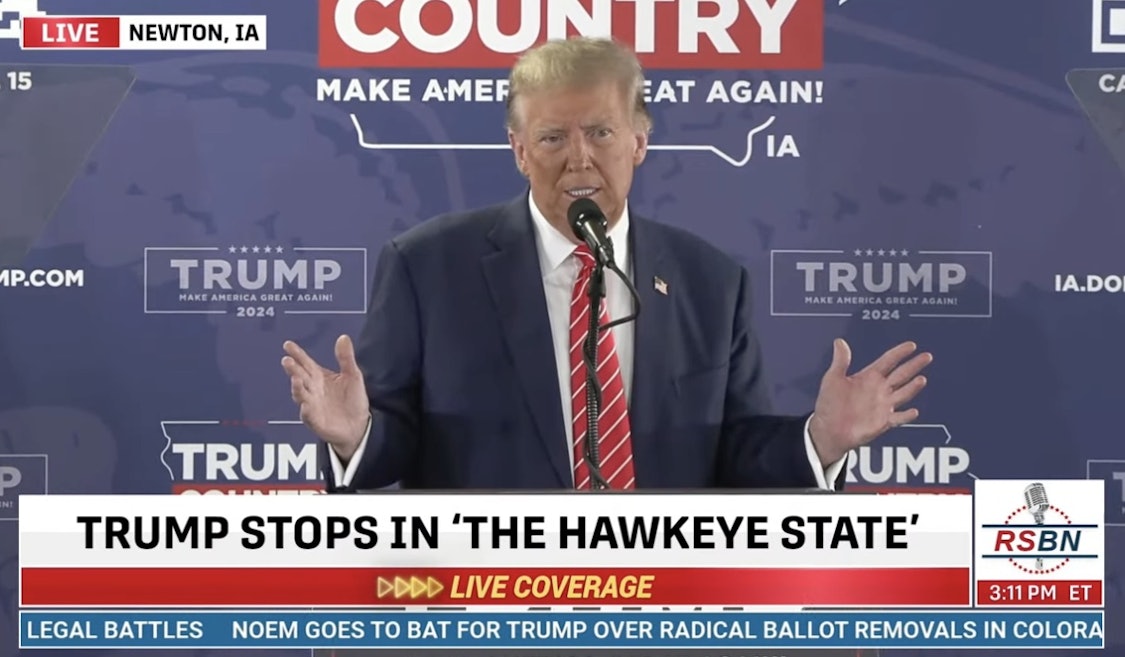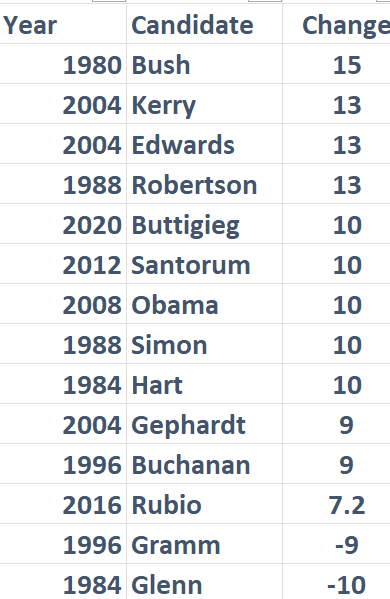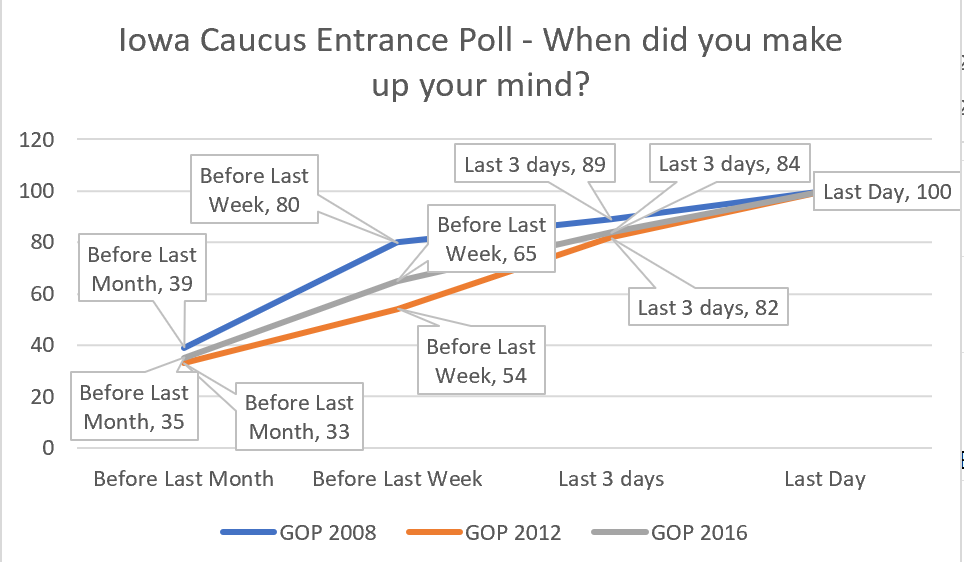
Screenshot of Donald Trump speaking at a rally in Newton, Iowa on January 12
Dan Guild is a lawyer and project manager who lives in New Hampshire. In addition to writing for Bleeding Heartland, he has written for CNN and Sabato’s Crystal Ball, most recently here. He also contributed to the Washington Post’s 2020 primary simulations. Follow him on Twitter @dcg1114.
I have written before about the incredible shifts that have happened late in Iowa caucus campaigns. Front runners beware, I wrote in 2016 (and that piece was prescient).
In 2020 I suggested Iowa would surprise, and predicted Pete Buttigieg would be the candidate most likely to do it.
This time it feels different, for good reasons.
The Republican front-runner has not debated his opponents. A former president is running far ahead of the others. The second and third-place candidates are locked in a negative advertising war. More than 80 percent of Trump voters tell pollsters they have made up their minds.
This chart shows the latest Iowa polling. Trump’s lead is the largest in Iowa caucus history, and his percentage is the highest for anyone in a multi-candidate field.

The largest swing between this point in the cycle and the final caucus result is 20 points. It would be the biggest upset in primary history if Trump did not win, exceeding even the 1980 New York Democratic Primary.
THE SOURCE OF TRUMP’S STRENGTH
Here are four important data points about the Iowa Republican electorate. The key to the GOP caucuses has always been the evangelical vote. That’s also why Iowa and New Hampshire are so different.

Trump’s strength is among evangelicals, those who call themselves very conservative, and those with a high school education. His margin among these groups is nothing short of astonishing, particularly when you remember they were Trump’s weakest groups in 2016. Interestingly, the margins in Iowa in these subgroups is not materially different from you see nationally, or even in New Hampshire (except for college-educated voters there).

WILL SOMEONE BREAK OUT?
In about two out of three Iowa caucuses, at least one candidate breaks out. Thirteen candidates have either gained or lost more than 9 percent in the last four days. I created this table to document notable surges.

A few conclusions jump out from the data:
- Among Republicans, social conservatives have surged late. Pat Robertson in 1988, Rick Santorum in 2012, and Pat Buchanan in 1996 all saw significant increases. Mike Huckabee surged over the last month of the 2008 caucus campaign, but at this point already led the field.
- No front runner has seen their percentage decline by more than 6 percent. With Trump over 50 percent in recent polls, it is impossible at this point to imagine him losing.
- Two late surges provide hope for Ron DeSantis and Nikki Haley. George H.W. Bush gained 15 points in the final days before the 1980 caucuses, and Marco Rubio gained 7 points toward the end in 2016. Neither was a social conservative.
HAVE IOWA REPUBLICANS ALREADY MADE UP THEIR MINDS?
The reason so many presidential candidates have surged is Iowa voters usually don’t decide until very late. As this table shows, in the last three GOP primaries, only 35 percent made up their mind before the last month.

But the polling this cycle has told a very different story. In October, a full three months before this year’s caucuses, 59 percent of likely caucus-goers had already made up their minds, according to the Iowa Poll by Selzer & Co for the Des Moines Register, NBC News, and Mediacom. In last month’s Fox News poll, 69 percent of caucus-goers and 86 percent of Trump supporters already had made up their minds.
THE BATTLE FOR SECOND
In the end, this Iowa caucus is about who finishes in second place. That has mattered in the past. Gary Hart rode a second-place finish in Iowa in 1984 to a win in New Hampshire, even though he finished more than 30 points behind Walter Mondale in Iowa. An often told story in New Hampshire is a candidate getting a bounce out of Iowa by winning the “expectations game.” So Iowa will matter, particularly with the margin between Trump and Haley narrowing in New Hampshire.
Still, it is difficult now to imagine Trump not winning the GOP nomination.

2 Comments
Not so fast Dano
I’ve been predicting for over a year that neither Biden or Trump will be the nominee for their respective party. Trump is facing multiple felony counts and even one conviction could derail his nomination. Biden’s diminished capacity alerts most reasonable Democrats except for those “age deniers’ hiding in their echo chamber. A lot can and will happen before November. Heaven help us if Biden and Trump are the two nominees as I will look elsewhere for someone to vote for. I don’t believe Trump will get 50% in the Iowa Caucus and it will be viewed as “not meeting expectations.” I’m glad Dan mentioned Gary Hart as I backed him in ’84 when he roared to an upset win in NH Primary and came within an eyelash of winning the nomination. Mondale won his home state on MN as the Hart camp time and time tried to convince the party that ole Fritz wasn’t electable – and they wouldn’t listen.
HHHdemocrat Fri 12 Jan 10:07 PM
no conviction is going to derail Trump's nomination
He will have clinched the nomination before the first trial starts. His criminal indictments increased his support among Republican voters.
Laura Belin Fri 12 Jan 10:24 PM